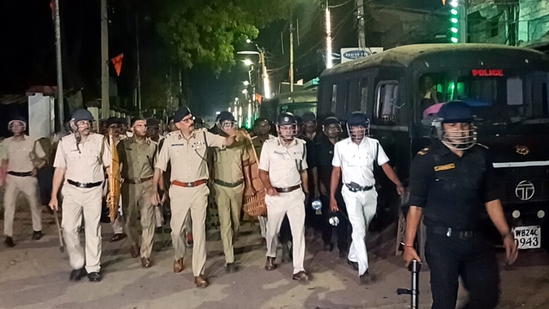Murshidabad : Tensions escalated in West Bengal as BJP leaders launched scathing attacks on Chief Minister Mamata Banerjee following the eruption of violence in Murshidabad over the contentious Waqf (Amendment) Bill. BJP national general secretary Tarun Chugh likened Banerjee to Pakistan’s founder Mohammad Ali Jinnah, accusing her of adopting a divisive political approach similar to that of the pre-Partition Muslim League, reported the Hindustan Times.
“Today, Mamata Banerjee’s image is no different from a modern-day Jinnah. Her party, the Trinamool Congress, is echoing the politics of the 1940s Muslim League,” Chugh told ANI. He condemned her silence over the deaths of three people in the violence, claiming it reflects a consistent neglect of Hindu safety under her government.
The protests, which turned violent in Murshidabad’s Dhuliyan and Samserganj areas, left several injured and led to large-scale property damage. In response, the West Bengal Police arrested around 150 individuals and deployed additional forces, including five companies of the BSF, following a request from the state government.
Echoing Chugh’s sentiments, BJP spokesperson Shehzad Poonawalla alleged the violence was “state-sponsored” and aimed at intimidating the Hindu community. “Temples have been vandalized, idols demolished, homes and shops of Hindus selectively set ablaze,” he claimed, pointing to a pattern of targeted harassment in the state.
Adding to the BJP’s offensive, senior party leader and Leader of Opposition Suvendu Adhikari stated that over 400 Hindus were forced to flee their homes in Dhuliyan due to fear and insecurity. He shared visuals of families taking refuge across the river in Malda district, calling it a humanitarian crisis brought on by “appeasement politics.”
In response, Mamata Banerjee appealed for calm and reassured protestors that the Waqf Amendment Act would not be enforced in Bengal. However, BJP leaders insist the state government’s stance has only emboldened radical elements, pushing Bengal towards communal instability.
The Waqf (Amendment) Bill, passed recently by Parliament, has drawn widespread criticism and sparked demonstrations in various parts of the country, particularly in Muslim-majority areas. Critics allege that the law undermines community rights over waqf properties, while supporters argue it ensures transparency and prevents land misuse.
The situation in Murshidabad remains tense as authorities continue efforts to restore peace.




